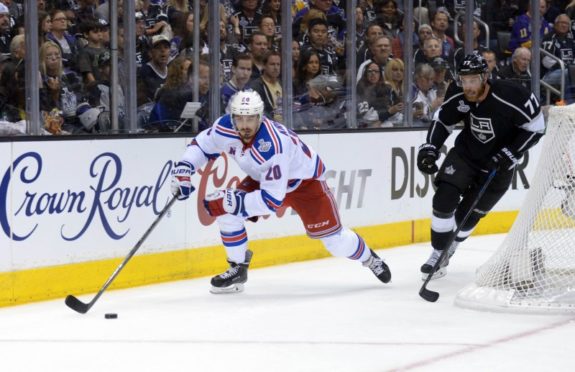With second-overall draft pick Kaapo Kakko on board, a bevy of other talented youngsters on the way, and the tantalizing possibility of signing Columbus Blue Jackets’ star Artemi Panarin imminent, the end of Chris Kreider’s tenure with the New York Rangers seems, in some circles, like a foregone conclusion.
Though it’s more speculation than rumors at this point, the sentiment nonetheless is that the Rangers will trade Kreider in order to open cap space and avoid having to do a rich extension with the winger that they might not see as worthy of such a commitment.
Is it possible, though, that the Rangers should be considering just that for their 2009 first-round pick?
After seven seasons in a Blueshirt, it seems fairly clear that Kreider has become a victim of his own vast potential, the perception of him as a player now unrealistically clouded by the myriad talents that at this point seem unlikely to ever be fully unleashed.

The Rangers and everyone else were right to believe that a 6-foot-3, 220-pound power forward that could skate like a man half his size and was impossible to handle down low – not to mention in possession of a wicked wrist shot used to finish off countless high-octane rushes to the net – might turn out to be the second coming of Brendan Shanahan.
It has become apparent, however, that the inconsistent Kreider probably won’t approach the lofty achievements of Shanahan, perhaps the best power forward of all time. The fact that more than a few evaluators saw the potential for that to happen, though, shouldn’t obscure what Kreider actually does bring – especially with the Rangers having reached the moment of truth on Kreider’s future.
Kreider’s Goals Per Game Rivals Panarin’s
What is indisputable is that the big guy from Boxford, Massachusetts, scores goals. Not as many as were predicted for him, of course, but he still puts the puck in the net. Kreider’s 114 tallies over the past five seasons are tied for 49th in the NHL, and that’s with him playing in only 58 games due to injury in 2017-18. He’s posted a 0.32 goals-per-game average the last four seasons, not way off the superb Panarin’s 0.36 over the same span.
Should the Rangers choose to cut ties with Kreider, most NHL general managers would take a player with two 28-goal seasons in his past three – with the injury interrupted 2017-18 resulting in a respectable 16 over the 58 contests. The Rangers should be able to get at least a first-round pick for him. Goal scorers – especially mostly durable ones that have played 75 or more games in four of the last five seasons – come at a premium. There aren’t that many of them.
Kreider and Panarin both totaled 28 goals last season. It’s not nearly a complete comparison, of course. Panarin’s 320 points over his four NHL seasons are the eighth-most in that span. The 27-year-old Russian left wing (28 in October) does quite a bit more than just score goals.
Kreider over the same time period? Tied for 107th with 185 points. It’s not difficult to see why Panarin will cost significantly more than Kreider in their respective next contracts.
The question for general manager Jeff Gorton is whether his club is ready to make the massive financial commitment that will be required to land Panarin. The number will likely have to be $11 million per year or more over seven years, given that the Florida Panthers – the likely frontrunners for Panarin’s services at this point – are working with the huge advantage of playing in a place that doesn’t have a state income tax.

For a still-rebuilding team that might have several teenagers in the lineup next season, it’s possible that the Rangers and Panarin might not be a great match right now, no matter how talented those teens and the club’s group of early 20-somethings might be.
All of this will amount to nothing more than hand-wringing should Panarin sign on the Rangers’ dotted line Monday. If he doesn’t, though, Gorton pivoting back to the idea of that extension with the homegrown Kreider, who has one year at $4.625 million remaining on his contract, might prove to be a better-than-average Plan B.
It will likely take $6-7 million per to get Kreids signed beyond 2019-20. Is that too much for a 28-year-old player that’s never reached 30 goals and scored only eight over his final 42 contests last season? Probably. That, of course, wouldn’t represent the first time in major professional sports that a team has to overpay a player it nevertheless needs. Not to mention that $6-7 million is less than $11 million.
Rangers Would Miss Kreider’s Style of Play
And while Kreider doesn’t come close to matching Panarin’s overall production, he does bring an in-demand style of play that isn’t at all a part of Panarin’s game. Kreider is one of the few Rangers that crashes the net and will stand in front of it, on the power play and with the Blueshirts controlling the puck in the offensive zone. His physical, north-south game fits second-year coach David Quinn’s philosophy to a T.
Panarin does his work from the outside with his pinpoint shooting and passing, and that work is of course sublime. With a significant skill-heavy European presence expected to be part of the core going forward, however, is it possible that Panarin’s addition and Kreider’s subtraction would leave the Rangers imbalanced, with not nearly enough goal-front presence and grind to complement all of the flash?
That question is, of course, relevant because the Rangers likely won’t be able to fit a Panarin signing and a Kreider extension under the salary cap. They’ll have to choose – or perhaps have already done so.
The Rangers know what they have in Kreider at this point – a streaky goal scorer who will dominate games in breathtaking fashion for stretches, his breakaway speed and strength on full display as he speeds to the net and bulls his way around the opponent’s zone.

Those are of course followed by often-longer stretches during which one can’t be sure if Kreider even played, his production and presence all but disappearing for weeks at a time.
The Blueshirts seem to be leaning toward going all-in on Panarin, and signing him would hardly be viewed as a mistake. The club might see untapped offensive potential in 23-year-old forward Brendan Lemieux, who plays the same style as Kreider, and is banking on him being able to potentially replace at least some of Kreids’ contributions.
For all of his faults, the Rangers are better with Kreider than without. If Panarin chooses no state income tax and plenty of sand and sun over the bright lights of Broadway, Gorton and the front office might want to consider keeping Kreider long-term for what he does do, rather than trading him away over what he doesn’t.